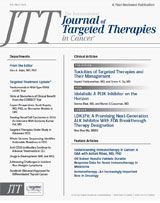Whole-Genome Sequencing Identifies Actionable Mutations in HCC
A research team at Cold Spring Harbor Laboratory in New York has succeeded in identifying the most common genetically altered genes and the major oncogenic drivers in hepatitis B virus-associated hepatocellular carcinoma (HCC).
JAK1).
By means of a whole-genome sequencing study of 88 matched HCC tumor and normal pairs, 81 of which were HPV-positive, the scientists identifiedbeta cateninas the most frequently mutated oncogene (15.9% of cases) and TP53 as the most frequently mutated gene suppressor (35.2% of cases). The Wnt/beta catenin (62.5% of cases) and JAK/STAT pathways (45.5% of cases) are likely to be two major oncogenic drivers in HCC, Kan et al reported in a June publication ofGenome Research.
Several inhibitors of enzymes or key components of cancer pathways that are commonly altered in HCC are currently in clinical development for other indications (Table), and based upon their established role in HCC, warrant testing in preclinical models and in patients with HCC, the investigators maintained. In particular, the authors pointed to the potential value of assessing existing JAK inhibitors for the treatment of HCC. One JAKtargeted agent, ruxolitinib, which was recently approved by the FDA for the treatment of myelofibrosis, should be considered for testing in patients with HCC with activatingJAK1mutations, the authors recommended.
Table. Potentially Actionable Mutations in HCC and Matched Clinical-Stage Inhibitors
Gene
Mutation
Amplification
Deletion
Combined Frequency
Inhibitor
JAK1
JAK1 (9.1%)
-
-
9.1%
JAK1 (ruxolitinib)
FAK
JAK1 (9.1%)
FAK (26.1%)
-
26.1%
FAKi (PF-04554878, PF-562271
CCND1,
CDKN2A
-
CCND1 (4.5%)
CDKN2A(10.2%)
14.7%
CDK4/6i(PD-0332991, LY835219, LEE011)
FGF19
-
FGF19 (4.5%)
-
4.5%
FGFRi (brivanib, BG1398, LY874455)
BRCA1/2,PARP1
-
BRCA1(1.1%)
BRCA2(5.7%)
-
25.0%
PARPi (AG-14699, olaparib)
In addition, PARP inhibitors may play a therapeutic role in HCC. Olaparib has been shown to have efficacy in studies withBRCA-related ovarian and breast cancer. The DNA repair pathway is “extensively altered” in HCC, according to Kan and colleagues, who said that although these alterations remain to be tested, there is empirical evidence for including HCC in PARP-inhibitor trials.

Enhancing Precision in Immunotherapy: CD8 PET-Avidity in RCC
March 1st 2024In this episode of Emerging Experts, Peter Zang, MD, highlights research on baseline CD8 lymph node avidity with 89-Zr-crefmirlimab for the treatment of patients with metastatic renal cell carcinoma and response to immunotherapy.
Listen
Beyond the First-Line: Economides on Advancing Therapies in RCC
February 1st 2024In our 4th episode of Emerging Experts, Minas P. Economides, MD, unveils the challenges and opportunities for renal cell carcinoma treatment, focusing on the lack of therapies available in the second-line setting.
Listen